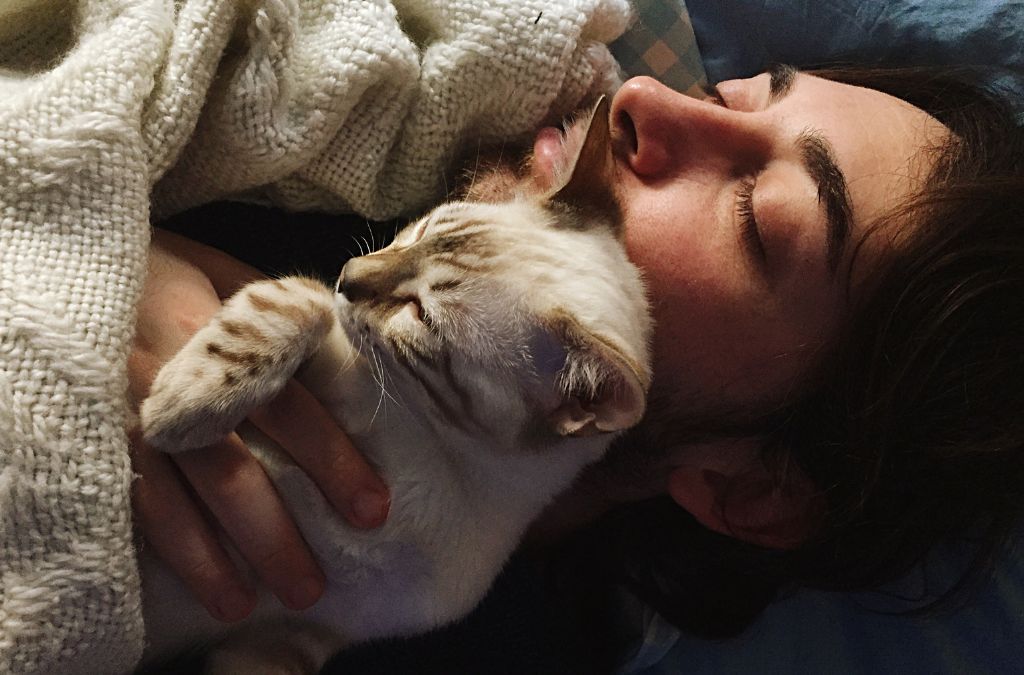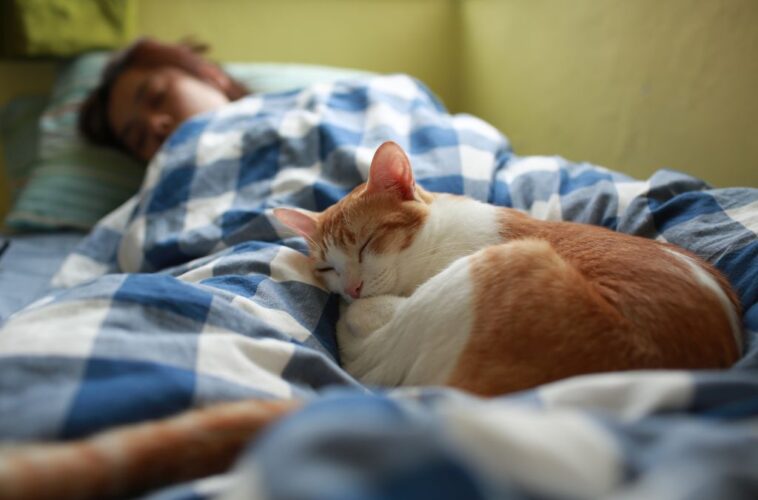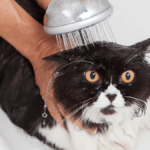As a cat owner, you may wonder, Why do cats sleep on you? While cats are known for their independent nature, many feline companions enjoy snuggling up with their humans and falling asleep on their laps or chests.
But what motivates this behavior? In this post, we’ll delve into the reasons cats tend to sleep on their owners, from seeking warmth and comfort to showing affection and seeking security.
By understanding why cats sleep on their humans, you’ll be better equipped to provide your feline friend with the love and care they need to thrive. So, let’s dive in and explore the fascinating world of feline sleep behavior.
Why Do Cats Sleep On You?
Cats are known for their love of comfort, and few things are more comfortable than a soft, warm lap. When a cat chooses to sleep on their human, it’s often because they find that person’s body a comfortable place to rest. The warmth of your body and the softness of your clothing or bedding can make for an ideal sleeping spot for a feline friend.
Here’s a more detailed explanation of why cats sleep on their humans:
- Comfort: As I mentioned earlier, cats are creatures of comfort, and they seek out soft, cozy places to rest and sleep. With its warm, soft cushioning, your lap is perfect for your cat to curl up and snooze.
- Warmth: Cats are naturally drawn to warm spots, and your body provides a cozy, warm place for your cat to rest. This can especially appeal to cats during colder months, when they may seek out warm places to conserve body heat.
- Bonding: Cats are social creatures, and they often seek out the company of their humans for comfort and security. Sleeping on you can be a way for your cat to feel closer to you and strengthen your bond.
- Trust: When a cat sleeps on you, it can be a sign that they trust and feel safe around you. This can be especially true if your cat is a rescue or has a history of being mistreated or abandoned. Sleeping on you can help your cat feel secure and build trust in your relationship.
- Attention: If your cat is seeking attention, it may sleep on you to get it. Cats are smart creatures, and they know that sleeping on their humans is a great way to get petted and fussed over.
- Territory: Cats are territorial animals who may choose to sleep on you to mark their territory. When a cat sleeps on you, they leave their scent behind, which can help them feel more secure in their environment.
Of course, every cat is different, and there may be other reasons your feline friend chooses to sleep on you. But if your cat chooses to snuggle up on your lap or chest, it’s a sign that they trust and love you and find comfort in your presence.
Understanding Your Cat’s Instincts
Cats are fascinating creatures with unique sleeping habits rooted in their instincts. Understanding the science behind feline sleep can help you better understand your cat’s needs and behaviors.
First, it’s important to know that cats are crepuscular animals, meaning they are most active during dawn and dusk. Like many wild cats, their ancestors were primarily nocturnal hunters. During the day, cats often slept to conserve energy for their nighttime hunts.
Cats are obligate carnivores, meaning their bodies are designed to digest and metabolize protein-rich meals quickly and efficiently. This can make them more prone to napping and sleeping throughout the day, as they need to conserve energy for their next meal.
Cats also have a unique sleep cycle compared to humans. They spend more time in light than in deep sleep, and they can fall asleep quickly and wake up abruptly. This is because they must react quickly to potential threats, even while sleeping.
It’s worth noting that cats are also creatures of habit and often establish routines regarding sleeping and resting. For example, your cat may have a favorite sleeping spot or prefer to nap at certain times.
Understanding your cat’s sleeping habits and instincts can help you create a comfortable and safe environment for them to rest and sleep. Providing a cozy, warm sleeping area and establishing a routine can help your cat feel secure and comfortable in their home.
Benefits of Sleeping with Your Cat

Why Sharing Your Bed Can Be Good for You and Your Feline Friend?
Many cat owners enjoy sharing their beds with their furry friends, and there are several benefits to sleeping with your cat.
- Stress Relief: Having a cat sleep with you can provide a calming effect and reduce stress and anxiety. Studies have shown that petting a cat can lower blood pressure and release feel-good hormones, such as serotonin and oxytocin, which promote relaxation and reduce stress levels.
- Comfort: As we’ve discussed earlier, cats are creatures of comfort, and they seek out cozy, soft places to sleep. Sleeping with your cat can provide a warm and comfortable environment for you and your furry friend.
- Bonding: Sleeping with your cat can help strengthen the bond between you and your pet. It can be a way for your cat to feel closer to you and for you to feel a sense of companionship and connection.
- Warmth: As mentioned earlier, cats are naturally drawn to warm spots, and your body provides a cozy, warm place for your cat to sleep. This can be especially comforting to cats during colder months.
- Security: For some cats, sleeping with their humans can provide security and safety. They may feel more protected and less vulnerable when close to their humans.
It’s worth noting that not all cats are good candidates for sleeping in bed with their humans. Some cats may be too active or disruptive at night, and others may have health or behavioral issues that make sleeping in bed with their humans difficult or unsafe. Sleeping with a cat may not be advisable if you or someone in your household has allergies or respiratory issues.
If you share your bed with your cat, establish clear boundaries and rules to ensure a comfortable and safe sleeping environment for you and your furry friend.
When Do Cats Sleep On You?
Cats have unique sleep cycles that are different from humans. While cats sleep for several hours each day, they do not sleep for long periods as humans do.
Cats spend about 70% of their lives sleeping, and they typically sleep in short, intermittent periods throughout the day and night.
So, when do cats sleep on you? Well, it depends on their sleep cycle. Cats are crepuscular animals, meaning they are most active during dawn and dusk. Generally, cats sleep more during the day and are more active at night.
Cats also tend to sleep in short bursts throughout the day rather than one long stretch of sleep at night. These naps can last from a few minutes to a few hours and occur at any time of day or night.
When your cat chooses to sleep, you can also depend on your cat’s personality and preferences. Some cats may prefer to sleep on their humans during the day, while others may choose to sleep on their humans at night. Some cats may switch between sleeping on their humans and in other cozy spots throughout the day.
Ultimately, when your cat chooses to sleep on you is up to their individual preferences and instincts. However, understanding your cat’s sleep cycles and habits can create a comfortable and safe sleeping environment for your furry friend.
The Pros and Cons of Sleeping with Your Cat
Sleeping with your cat can be a wonderful way to bond with your furry friend and provide them with a warm, cozy sleeping environment. However, it’s important to weigh the pros and cons before deciding whether or not to share your bed with your cat.
Pros:
- Bonding: Sharing your bed with your cat can foster a deeper connection between you and your furry friend. This can create a greater sense of companionship and closeness for you and your cat.
- Stress Relief: Sleeping with a cat can be calming and help reduce stress and anxiety. Petting a cat has been shown to lower blood pressure and release feel-good hormones like serotonin and oxytocin, promoting relaxation and reducing stress.
- Comfort: Cats are creatures of comfort, seeking cozy, soft places to sleep. Sleeping with your cat can provide a warm and comfortable environment for you and your furry friend.
Cons:
- Disruption: Some cats may be too active or disruptive at night, making it difficult for their humans to sleep. Cats may scratch, meow, or walk around the bed during the night, which can be disruptive and annoying.
- Hygiene: Cats are known for grooming themselves frequently, which can lead to shedding and dander on your bed. This can be a problem for people with allergies or respiratory issues.
- Safety: Sleeping with your cat can be unsafe if your cat is prone to aggressive behavior or has health issues that make sleeping in bed with their humans difficult or dangerous.
It’s important to weigh these pros and cons before deciding whether or not to sleep with your cat. If you decide to share your bed with your furry friend, establish clear boundaries and rules to ensure a comfortable and safe sleeping environment for you and your cat.
Body Parts That Cats Would Choose To Sleep
Cats are known for their love of cozy spots and their ability to curl up into tight spaces. However, when it comes to sleeping on their humans, cats have the preferred body parts they like to snuggle up against.
- Chest: Many cats sleep on their humans’ chests, particularly if they are looking for warmth and comfort. This can be a cozy spot for both the cat and their human, as the cat can feel the rise and fall of their human’s chest as they breathe.
- Feet: Some cats prefer to sleep at the foot of the bed or on their humans’ feet. This can be a way for the cat to feel secure and protected, as they are close to their human body and can sense their movements.
- Lap: Cats are known for their love of laps, and many cats will curl up in their humans’ laps for a nap. This can allow the cat to feel close to their human and enjoy their lap’s warmth and comfort.
- Arms: Some cats sleep in their human arms, particularly seeking security and comfort. This can be a cozy spot for the cat and their human, as they can snuggle up together and enjoy each other’s company.
Ultimately, the body part your cat prefers to sleep on depends on their preferences and instincts. By paying attention to your cat’s behavior and body language, you can learn more about their preferred sleeping spots and create a comfortable and safe environment for your furry friend.
How To Deal With Your Cat Demanding Your Attention
Cats are known for their independent nature but also crave attention and affection from their humans. Sometimes, cats may demand their humans’ attention in ways that can be frustrating or disruptive, such as meowing loudly, pawing at their humans, or even knocking things over. Here are some tips for dealing with your cat when they demand your attention:
- Provide Enrichment: Ensure your cat has plenty of toys and activities to keep them entertained and engaged. This can include scratching posts, puzzle feeders, and interactive toys that will keep your cat mentally stimulated and physically active.
- Set Boundaries: It’s important to set boundaries with your cat and establish clear rules for when it’s okay to demand attention and when it’s not. For example, if your cat meows loudly at night, you may want to establish a no-meowing rule during sleeping hours.
- Ignore Bad Behavior: When your cat demands attention in a disruptive or annoying way, it’s important not to reinforce that behavior by giving in to their demands. Instead, try ignoring the behavior or redirecting your cat’s attention to a toy or activity.
- Schedule Playtime: Set aside regular playtime sessions with your cat to give them the attention and affection they crave. This can be a way to bond with your cat and provide them with the stimulation they need to stay happy and healthy.
- Seek Professional Help: If your cat’s demanding behavior is causing significant disruption or stress, it may be time to seek help from a professional behaviorist. They can help you understand your cat’s behavior and provide you with strategies for positively managing their demands.
By following these tips, you can learn how to deal with your cat when they demand your attention and provide them with the love and care they need to thrive.
Conclusion
Cats sleeping on their humans is a common behavior attributed to various factors, including comfort, security, and affection. Understanding your cat’s individual sleep preferences and behaviors can help you create a safe and comfortable sleeping environment for your furry friend.
While sleeping with your cat can provide several benefits, it’s important to consider the potential drawbacks, such as sleep disturbance and allergies. By weighing the pros and cons and taking steps to manage your cat’s behavior, you can determine whether sleeping with your cat is the right choice for you.
When dealing with your cat’s demands for attention, it’s important to establish clear boundaries and provide them with plenty of enrichment and playtime. You can build a strong and positive relationship with your feline companion by understanding your cat’s behavior and providing them with the love and care they need.




